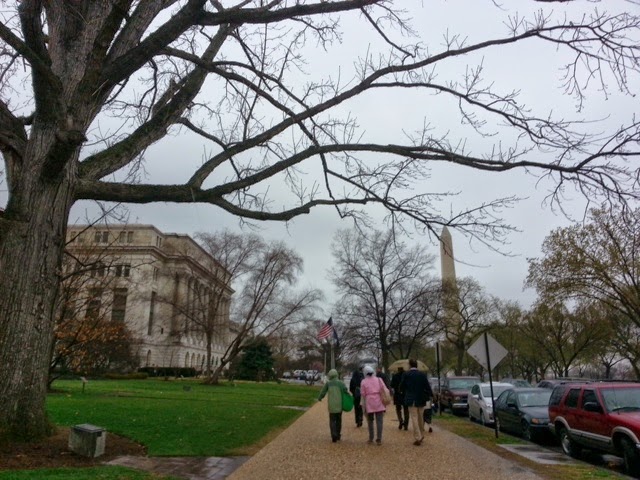National Trip Day 1
Well, lets try this again. I lost my last post.
Our first day in our nation’s capital started off rainy and cold. We are all bundled up to go to our first meeting at USDA.
On our way to the USDA building. Not the best weather, but better than snow!

M”
We first heard about the NRCS programs starting with Tom Christensen, Associate Chief of Operations. He gave us an overview of the programs and their mission to create a climate of success.
Tony Kramer, Deputy Chief of Programs spoke with us about specific portions of the Farm Bill that NRCS played a part in, like the Ag Conservation Easement Program. As of this year, all Farm Bill programs are being implemented.
We also heard from David Smith, Director of the Soil Science Division, Ron Harris, Director of Outreach and Advocacy Division, and Lesia Reed, Deputy Chief of Strategic Planning and Accountability. They mentioned here the desire to assess what sociological impact does conservation projects have on not just farmers, but the whole community.
After we heard about the NRCS programs, we heard from Eleanor Starmer, the National Coordinator & Advisor for Local & Regional Food Systems. She spoke to us about the Know Your Farmer Know Your Food Initiative, which was established in 2009. She directed us to the Know Your Farmer webpage (www.usda.gov/knowyourfarmer) which not only provides information about the program, but also acts as a portal to other resources available to farmers, like grants and loans. One great thing Tyler brought up during this discussion – How do you promote local ag without demonizing industrial ag?
Jennifer Yezak, Director of External & Intergovernmental Affairs, spoke to us next about their mission of working collaboratively with state departments of agriculture, particularly through NASDA. The most common issues she sees across many states are energy issues and disaster relief response.
Many of us were interested in the talk in FSMA from Anne MacMillan, Deputy Chief of Staff. She brought up many issues that are of most concern: raw manure, water, packinghouses, and alternatives and variances. The noted difficulty with FSMA is that the requirements are specific to farms of certain size and type, not addressing the constraints already felt by farms in Hawaii.
Kathryn Hill was our lovely coordinator for our morning at USDA and she gave us a brief history of the building.
We were also lucky enough to eat at the USDA Executive Dining Room. It was a great buffet, with a great view!
After some free time, we met up again at the University Club to hear from professional lobbyists Chandler Keys of Keys Group and Jeff Blackwood from BASF. The resounding theme here as well as i the morning was communication. Mr. Keys went even further to express how important it is to not communicate what you want, communicate what you NEED.
After the end of the day, we gathered at Blackfin for some well-deserved drinks and pupus. Not a bad first day!